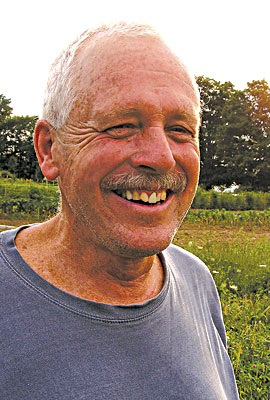 |
| Peter Hagerty. English photo. |
By Holli Cederholm
Twelve years ago Peter Hagerty, of Porter, Maine, helped found MOFGA’s Low Impact Forestry (LIF) group, which offers a safe environment for individuals to learn skills pertinent to working in the woods with horses and cattle. The group held its first workshop in November 1999, drawing participants from throughout Maine.
The LIF group still holds its three-day workshop each November at MOFGA’s Common Ground Education Center in Unity. Hagerty’s primary role during the workshop is working with the horses, especially the new horses, and acting as a sort of consultant for the owners.
Participants are encouraged to bring their horses to the workshop so that they that can practice the skills together, as teamster and team. Working in the woods is often dangerous, as it calls for a functional mix of sharp tools, heavy machinery and falling limbs or whole trees. As Hagerty puts it, “Your awareness needs to be at 200 percent.” To that end, he assesses whether horses new to logging are fit to work in such an environment. “The real concern is safety …” said Hagerty. “In 12 years we have not had a serious accident.”
Hagerty speaks from experience, working with both trained and untrained horses. He began logging in 1974, when he and a neighbor formed a small business using retired horses purchased from commercial logging jobs in Maine.
Later Hagerty and his wife, Marty Tracy, purchased an 8-month-old team, registered as Cornish Ploughman’s Nick and Hogback Willy Do. Working with Willy – who was afraid of everything and posed both a challenge and a risk – catalyzed a change in how Hagerty viewed his working relationship with horses, from viewing horses as strictly a tool to trying to understand them.
“I realized that horses had a real role to play for human beings,” said Hagerty, noting two qualities that helped him formulate this view: “Horses live in the present, and they do not tolerate unauthentic behavior.”
Hagerty attributes Nick and Willy’s biting and kicking their way through his defenses with guiding him to appreciate them (and horses in general) and being in the woods much more. “They really forced me to change my behavior,” he said.
Hagerty no longer runs the logging company with his neighbor. That enterprise started winding down in the mid-80s, when Hagerty and his wife shifted their attention to the world of “wool and international diplomacy” with their business, Peace Fleece. However, Hagerty still keeps four workhorses and two riding horses. “My wife and I try to work four days a week, before supper, in the woods,” he said.
Hagerty also participates in the annual commercial harvest from MOFGA’s woodlot, and he can be seen working with horses at the Common Ground Country Fair. He started bringing Willy, who will be 14 this spring and remains difficult to work with, to the Fair last year to both practice and exhibit trust-building work between a horse and its owner.
“Being a part of MOFGA is a huge part of my life,” said Hagerty. “I am so grateful for the role models I have there … both two-legged and four-legged.”
